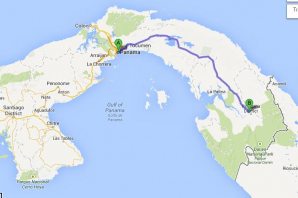Quebrada Honda, Panama
![]()
![]()
![]()
![]()
![]()
![]()
![]() Click on Programs to learn more about their work in this community
Click on Programs to learn more about their work in this community
General Information
| Population* | 501 |
| Number of homes | 128 |
| Avg # of people per home | 3-4 |
| Electricity | Yes |
| Corregimiento | Santa Fe |
| District | Chepigana |
| Corresponding Health Center | Santa Fe |
| Distance from compounds | 1.5 hours |
| Road conditions | Good |
* Population does not reflect how many patients will be seen on medical
brigades as many people from surrounding communities come seeking
Medical Brigades medical attention.
Expressed Needs and Capacities
The community of Quebrada Honda is a rural, Latino community along the Pan-American Highway. The community's leaders have listed three areas that need the most improvement: road access, growing its school, and water access.
Quebrada Honda has one school: a primary school that educates children between the grades of Kindergarten and 6th grade. The school is located in the center of the community and currently has 43 students. 6 teachers work at the school and share 4 classrooms. Additionally, the school has a computer lab, a kitchen, a dining room, and a playground.
Quebrada Honda's water system is maintained by a Water Committee. The water system is powered by a turbine, but the water's availability is not reliable; the water pressure is frequently very low if there is any water available at all. The community only gets water about one day out of three. The community members purify the water by either chlorinating it in their homes or by boiling it. 95% of the community is connected to this water system; each household pays $3.00 per month to use it.
Quebrada Honda does not have a health center; the nearest one is in Santa Fe. The community's most common illnesses are high blood pressure, colds, and diarrhea. Similarly, Quebrada Honda does not have access to dental care in its immediate surroundings. The community has several fertilizer latrines that were constructed by the Peace Corps in 2007. Only about half of the households have cement floors.
Approximately 90% of Quebrada Honda's members work in agriculture; the community's main crops are beans, corn, plantains, and yams. There is no credit available in Quebrada Honda; instead, community members must travel to Meteti to acquire loans and financial assistance. The community has a few small businesses: a super market, small stores, restaurants, two workshops, and a cantina.
Quebrada Honda has one system of environmental protection in place: an organic garden set up by the group Pro Niños of Darién. However, Quebrada Honda does not have a system of garbage disposal currently; instead, community members dispose of trash by either burning it or by burying it.
Currently, there is no source of legal aid available in Quebrada Honda; the community has no lawyers. The closest source of legal counsel is in Santa Fe. The typical sources of legal conflict in Quebrada Honda deal with pension, child support, and domestic violence. Approximately 80% of the community has land titles for their homes.
Quebrada Honda is represented by the deputy Eriberto Rios. He represents the community in the area's local legislature.
A few other organizations work in Quebrada Honda. For instance, the Peace Corps had assisted the community in 2007 by constructing composting latrines. Pro Niños de Darién assists the community with the preservation of its natural environment. Additionally, the governmental organization IDAAN has helped set up the water system in Quebrada Honda.
Currently, Medical and Dental brigades are the only Global Brigades programs operating in Quebrada Honda. The community is excited to host more brigades in January 2014!
Source of information: Key informant interview
Date of interview: Summer 2013
Last Updated: December 5, 2013
